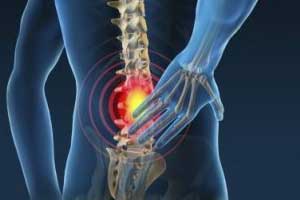- Home
- Editorial
- News
- Practice Guidelines
- Anesthesiology Guidelines
- Cancer Guidelines
- Cardiac Sciences Guidelines
- Critical Care Guidelines
- Dentistry Guidelines
- Dermatology Guidelines
- Diabetes and Endo Guidelines
- Diagnostics Guidelines
- ENT Guidelines
- Featured Practice Guidelines
- Gastroenterology Guidelines
- Geriatrics Guidelines
- Medicine Guidelines
- Nephrology Guidelines
- Neurosciences Guidelines
- Obs and Gynae Guidelines
- Ophthalmology Guidelines
- Orthopaedics Guidelines
- Paediatrics Guidelines
- Psychiatry Guidelines
- Pulmonology Guidelines
- Radiology Guidelines
- Surgery Guidelines
- Urology Guidelines
BMJ study does not support antibiotic treatment for chronic low back pain

Norway: Antibiotic treatment with amoxicillin versus placebo in patients with chronic low back pain did not provide any clinically important benefit, according to a recent study. Results of the study, published in the BMJ journal, do not support the use of antibiotic treatment for chronic low back pain and Modic changes.
"The current management of low back pain causes a low to moderate improvement in pain and disability. Therefore, there is a need to identify subgroups of patients who would benefit from a specific treatment," wrote the authors. "A suggested subgroup of patients with chronic low back pain has signal changes in the vertebral bone marrow that extends from the endplate (Modic changes) on magnetic resonance imaging. Modic changes are classified into type 1 (oedema type), type 2 (fatty type), and type 3 (sclerotic type, less common)."
Lars Christian Haugli Braten, physician, FORMI, Oslo University Hospital HF, Oslo, Norway, and colleagues assessed the efficacy of three months of antibiotic treatment compared with placebo in patients with chronic low back pain, previous disc herniation, and vertebral endplate changes (Modic changes).
This double-blind, parallel-group, placebo-controlled, multicentre trial involved 180 patients with chronic low back pain, previous disc herniation, and type 1 (n=118) or type 2 (n=62) from hospital outpatient clinics at six hospitals in Norway. Modic changes enrolled from June 2015 to September 2017. They were randomized to three months of oral treatment with either 750 mg amoxicillin or placebo three times daily.
Key findings include:
- In the primary analysis of the total cohort at one year, the difference in the mean RMDQ score between the amoxicillin group and the placebo group was −1.6.
- In the secondary analysis, the difference in the mean RMDQ score between the groups was −2.3 for patients with type 1 Modic changes and −0.1 for patients with type 2 Modic changes.
- Fifty patients (56%) in the amoxicillin group experienced at least one drug-related adverse event compared with 31 (34%) in the placebo group.
"In this study on patients with chronic low back pain and Modic changes at the level of a previous disc herniation, three months of treatment with amoxicillin did not provide a clinically important benefit compared with placebo. Secondary analyses and sensitivity analyses supported this finding," wrote the authors.
"Therefore, our results do not support the use of antibiotic treatment for chronic low back pain and Modic changes," they concluded.
More Information: "Efficacy of antibiotic treatment in patients with chronic low back pain and Modic changes (the AIM study): double-blind, randomised, placebo-controlled, multicentre trial" published in the BMJ journal.
DOI: https://doi.org/10.1136/bmj.l5654
Journal Information: the BMJ

Disclaimer: This site is primarily intended for healthcare professionals. Any content/information on this website does not replace the advice of medical and/or health professionals and should not be construed as medical/diagnostic advice/endorsement or prescription. Use of this site is subject to our terms of use, privacy policy, advertisement policy. © 2020 Minerva Medical Treatment Pvt Ltd